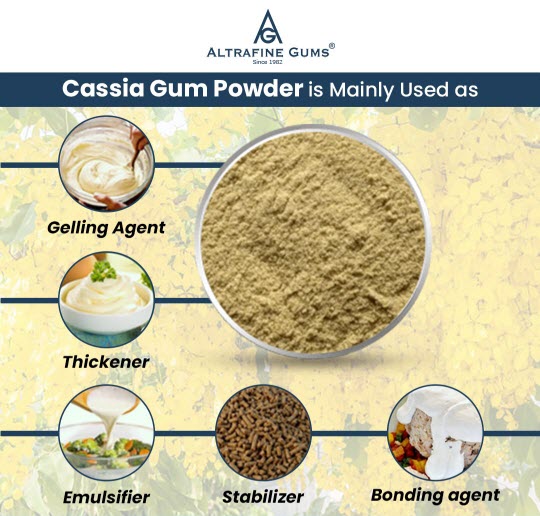What is Cassia Gum Powder?
Cassia gum powder is a natural, plant-based hydrocolloid derived from the endosperm of Cassia tora seeds. It is widely used as a thickener, emulsifier, stabilizer, and gelling agent in various industries, including food, pet care, and cosmetics. The unique properties of cassia gum make it highly versatile and effective in improving the texture, stability, and shelf life of different products.
- Food Industry: In the food sector, cassia gum is commonly used to enhance the texture of dairy products, sauces, and processed meats. It is also a key ingredient in making gel-based desserts and confectioneries.
- Pet Care: In pet food production, cassia gum helps stabilize canned and wet pet foods, ensuring the ingredients stay well-mixed and appealing in texture.
- Cosmetics and Personal Care: Cassia gum is used in creams, lotions, and personal care products for its emulsifying and stabilizing properties, giving a smooth and consistent feel to these products.
- Why Cassia Gum?: Its natural origin and effective performance make cassia gum an attractive alternative to synthetic thickeners and stabilizers, aligning with the increasing demand for clean-label and environmentally friendly ingredients.
Choosing the Right Manufacturer
Selecting a reliable cassia gum powder manufacturer is crucial to ensuring product quality and consistency. Here are some factors to consider:
- Quality Assurance: Look for manufacturers that prioritize quality assurance throughout their production processes. High-quality cassia gum should have consistent viscosity, purity, and gelling properties, which are essential for effective performance in various applications.
- Certifications: Reputable manufacturers should hold certifications such as ISO, HACCP, and GMP. These certifications indicate that the manufacturer adheres to international standards for safety, quality, and good manufacturing practices.
- Reliability and Consistency: Choose a manufacturer known for reliable and consistent supply. This is especially important for businesses that require a steady supply of cassia gum for continuous production.
- Customer Support: A good manufacturer should provide excellent customer support, including technical assistance, prompt communication, and the ability to address any quality concerns or issues.
- Supplier Evaluation: Conducting a thorough evaluation of potential suppliers, including visiting their facilities if possible, can help you make an informed decision and establish a long-term partnership.
Production Process and Quality Control
Understanding how cassia gum powder is produced and the measures taken to ensure quality can help you choose the right manufacturer. Here is an overview of the production process:
- Harvesting and Cleaning: The production of cassia gum starts with harvesting Cassia tora seeds. The seeds are thoroughly cleaned to remove impurities and foreign matter.
- Dehusking and Milling: The seeds are dehusked, and the endosperm is separated from the husk. The endosperm is then finely milled into powder form.
- Purification and Quality Control: The milled cassia gum powder undergoes purification to remove any residual impurities. Manufacturers implement stringent quality control measures, such as viscosity testing, microbial analysis, and purity checks, to ensure that the final product meets industry standards.
- Importance of Quality Control: Consistent quality control is essential to maintain the functional properties of cassia gum, such as gelling strength and stability, making it suitable for diverse applications in food, pet care, and cosmetics.
Applications and Benefits
Cassia gum powder offers several benefits and is used in a wide range of applications:
- Food Thickening: In the food industry, cassia gum is used to thicken sauces, dressings, and dairy-based products. It enhances the mouthfeel and ensures a smooth, creamy texture.
- Pet Food Stabilization: Cassia gum is a crucial ingredient in pet food formulations, especially in canned and wet pet foods. It stabilizes the product, prevents ingredient separation, and ensures an even distribution of nutrients.
- Industrial Applications: Beyond food and pet care, cassia gum is used in cosmetics, pharmaceuticals, and textile processing. It acts as an emulsifier in skincare products, ensuring a uniform texture and enhancing product stability.
Benefits:
- Natural and Safe: Cassia gum is derived from natural sources, making it a safer alternative to synthetic additives.
- Versatile Functionality: Its ability to gel, stabilize, and emulsify makes it useful in a wide range of formulations.
- Cost-Effective: Compared to other natural hydrocolloids, cassia gum is relatively affordable and effective, offering cost benefits to manufacturers.

Regulations and Compliance
The global market for cassia gum powder is heavily regulated to ensure product safety, especially in food and pet care applications. Understanding these regulations is crucial for both manufacturers and buyers.
- Global Standards: The use of cassia gum in food is regulated by various organizations, including the U.S. Food and Drug Administration (FDA) and the European Food Safety Authority (EFSA). These organizations set strict guidelines for purity, permissible usage levels, and labeling.
- Safety Guidelines: Cassia gum must be free from harmful contaminants such as heavy metals and pesticides. Manufacturers must also ensure that the product does not contain any unauthorized additives or preservatives.
- Compliance Requirements: Manufacturers must provide documentation and certificates proving compliance with regulatory standards. This includes Certificates of Analysis (COAs) and safety data sheets that detail the product’s specifications and quality parameters.
- Navigating Regulations: Staying up-to-date with global regulatory changes is crucial for manufacturers and importers to ensure the product remains compliant and safe for use in different markets.
Market Trends and Global Demand
The cassia gum industry is evolving rapidly, with new trends and growing global demand shaping its future.
- Rising Demand in Food and Pet Care: The demand for natural thickeners like cassia gum is increasing in the food and pet care sectors, driven by consumer preference for clean-label products and healthier food options for pets.
- Innovation and Technological Advancements: Advances in processing technology are improving the functionality of cassia gum, making it more effective and easier to incorporate into complex formulations.
- Sustainability Focus: As environmental awareness grows, the cassia gum industry is prioritizing sustainable farming practices and eco-friendly production processes. This shift is expected to have a significant impact on sourcing and supply chain practices.
- Future Outlook: Analysts predict steady growth in the global cassia gum market, with opportunities for innovation and expansion into new applications, such as bioplastics and natural cosmetics. The focus on sustainability and natural ingredients is likely to drive further adoption and market penetration.

FAQs About Cassia Gum Powder
1. What is cassia gum powder, and where is it used?
Cassia gum powder is a natural thickener and stabilizer derived from Cassia tora seeds. It is used in the food, pet care, and cosmetics industries to improve product texture and stability.
2. How do I choose a reliable cassia gum powder manufacturer?
Look for manufacturers with quality certifications (e.g., ISO, HACCP, GMP), a reputation for consistent supply, and robust quality control measures.
3. What are the benefits of using cassia gum in food products?
Cassia gum improves the texture and stability of food products, such as sauces, dairy items, and desserts, and provides a smooth, creamy mouthfeel.
4. Is cassia gum safe for pet food applications?
Yes, cassia gum is widely used in pet food to stabilize wet and canned formulations, ensuring even distribution of nutrients and a consistent texture.
5. What regulatory standards must cassia gum meet?
Cassia gum must comply with regulations set by organizations like the FDA and EFSA, ensuring it is free from harmful contaminants and suitable for use in food and pet products.
6. Why is cassia gum considered a sustainable ingredient?
Cassia gum is plant-derived and biodegradable, making it an eco-friendly alternative to synthetic thickeners. Many manufacturers are also adopting sustainable farming practices.
7. How is cassia gum different from guar gum?
While both are natural thickeners, cassia gum has a stronger gelling ability and is particularly effective when used in combination with other hydrocolloids, such as carrageenan.
8. What are the future trends in the cassia gum market?
Trends include increasing demand for natural ingredients, advancements in processing technology, and a focus on sustainable sourcing and production methods.

